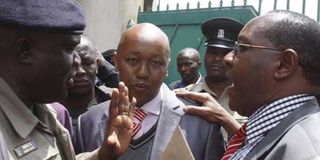We can still turn around KPCU, says chairman

KPCU current chairman William Gateri (centre) and Mr Njuguna Kiongo argue over legal issues at the union's headquarters in Nairobi on August 15, 2015. Mr Gateri faces the same monumental problem his predecessors did of turning around the fallen giant. PHOTO | MARTIN MUKANGU | NATION MEDIA GROUP
What you need to know:
- After managing to convince KCB to lift its receivership, he faces the same monumental problems experienced by his predecessors.
- We want farmers to follow their coffee through the milling to the auction.
- We have told the debtors we shall engage professional debt collectors.
Turning KPCU around is the new headache facing its current chairman, Mr William Gatei. After managing to convince KCB to lift its receivership, he faces the same monumental problems experienced by his predecessors.
He walks us inside the building in Nairobi that housed a five-story high coffee mill.
One of the open offices has a tiny sticker on the wall: “Do what you can, with what you have where you are – T. Roosevelt”.
Spilt coffee beans, dust and debris lie all over the place.
We enter the former empty bags office.
A lone portrait of former President Mwai Kibaki still hangs on the wall.
There is an empty thermos flask, and an old 2005 wall calendar.
The parchment store manager’s office is locked.
Nobody has the keys and one of the windows is broken to allow visitors to peep inside.
We glance inside: There are two tables, and tens of files scattered on the floor and on a lone shelf. What was once a citadel of hope for coffee farmers lies desolate. Excerpts:
You have inherited a shell?
Those who brought down KPCU did not want it to ever come back.
The receiver manager allowed all the licences to expire and we had to lobby to get a milling licence from the Coffee Board.
We still don’t have a marketing licence. He also allowed our mill to be stolen.
How different will you be from your predecessors?
We want farmers to follow their coffee through the milling to the auction.
They have to send their representatives to see what is happening at each stage of the process.
We also want to start selling coffee locally and we have a new brand in the market.
We are now raking in more money for the farmer than before and these profits will be paid to the shareholders.
We still have modern mills across the country and that gives us a solid base.
But your farmers have moved on.
We are enticing them back with a cash model.
We pay them after they deliver their beans to us and that is working for us.
Our only problem is with the Coffee Directorate (formerly Coffee Board), which has denied us a marketing licence.
They are continuing to frustrate the KPCU. I think we can still turn around the KPCU.
You have been speaking about a fertigation project. What is this?
We want to help irrigate coffee farms and use fertilisers to increase production.
This will involve the leasing of coffee farms.
We shall not give farmers any cash but will instal irrigation networks on the farms.
We shall also pay for the labour and deduct it from the dues.
We have spoken to several banks and we have an Israeli firm, which has been doing preliminary studies and designing the project.
We expect farmers to earn at least Sh57,000 per half acre.
Fertigation is the best way to revive coffee farming in Kenya and we want to start with 5,000 acres.
We pray that the government can give us the Sh2 billion guarantee.
How do you intend to collect the historical KPCU debts?
We have told the debtors we shall engage professional debt collectors. We have also informed them that we might sell the debts.
The Coffee Directorate owes KPCU Sh1.2 billion and we are demanding to get back both Kahawa House and Coffee Plaza because they belong to the farmers.
These were assets built by farmers and the government cannot nationalise them. In any case the Coffee Directorate should hire them from farmers.
How did the receiver leave and what was the agreement?
When we were elected, we were given a PWC report, which showed we owed KCB Sh1.2 billion.
We were asked to mobilise the money and we negotiated the debt to Sh400 million.
We raised Sh100 million cash and paid the bank and they allowed us back on condition that we get three-year term to implement our turnaround plans.
We have been repaying the loan from our rent and the bank has appointed an agent who collects the money.
Your critics say that KPCU has no shareholder register?
The shareholders’ register is intact.
Shares are sold to farmers at Sh10 although some are reluctant to increase their shares because of past problems.
In our last Annual General Meeting, the farmers agreed that we shall soon list the shares to unlock the value.
It is one way of raising money for the KPCU and it is far much better than a bank loan. On our critics, we have an election next July.




